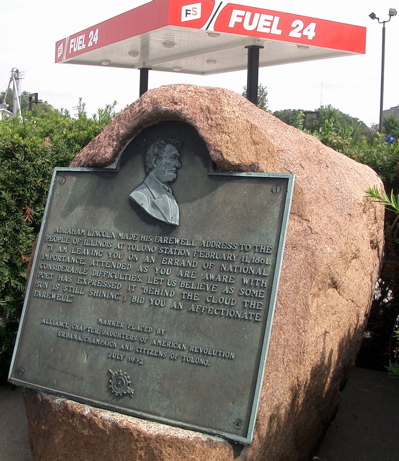When it comes to any subject, there’s good trivia and bad trivia; or maybe not bad, but ho-hum, something that fits too easily onto a Trivial Pursuit card An example of uninspiring trivia might be: Elvis Presley died on August 16, 1977. An example of good (or at least better) trivia might involve where Elvis was when he was fatally stricken and what was he doing. (For the uninitiated, here’s the scatologist’s-eye view of the King’s passing.)
So I’ve been engaged in some bad and not-so-bad presidential trivia. It’s kind of a way to relax, I guess — or at least put part of my brain on idle (a big part, because I can’t claim any inspirations, related or unrelated, large or small, happened while I focused on this). It started with a simple question, now that Lincoln’s and Washington’s birthdays and Presidents Day have passed: In which month were the most presidents born (posted separately)?
When I start looking at a list of dates, all sorts of facts stick out and relationships suggest themselves. In presidential birth and death dates, perhaps the best-known and most striking is July 4, 1826, the day John Adams and Thomas Jefferson died; a less-mentioned coincidence is that a third president in first five, James Monroe, also died on the 4th of July, in 1831. That kind of coincidence doesn’t show up much in birth dates. Just two presidents — James K. Polk and Warren Harding — share a birthday, November 2 (start planning now).
Ronald Reagan lived longest of all the presidents, 93 years and 120 days. Gerald Ford, born July 14, 1913, could tie the record on Columbus Day this year. Herbert Hoover enjoyed — maybe endured is a better word — the longest retirement, 31 years and seven months. Ford’s in a solid second place in the retirement rankings, but two and a half years behind Hoover; Jimmy Carter, Ford’s successor is No. 4 in the retirement rankings; he’s not gaining on Ford, obviously, but he’ll move into the No. 3 spot, ahead of one-time dual longevity/retirement king John Adams, in early May. (And the shortest retirement? The aforementioned Polk, who outlived his single term by just three months.)
This is the kind of stuff they’re not teaching in our public schools.
After poring over some of the presidents’ biographical data, I did come up with a category that I’m sure someone out in the universe has happened upon but which hasn’t made it into the Wikipedia’s weirdly complete catalog of presidential trivia (see the very end of the entry President of the United States). The little seam I found to mine is represented by our current president and his predecessor: Of all the 42 men who have served as president, the two born closest together are Bush and Clinton. The list:
1. G.W. Bush (7/6/1946)-Clinton (8/19/1946): 44 days.
2. A. Johnson (12/29/1808)-Lincoln (2/12/1809): 45 days.
3. G.H.W. Bush (6/12/1924)-Carter (10/1/1924): 111 days.
4. Jackson (3/15/1767)-J.Q. Adams (7/11/1767): 118 days.
5. Grant (4/27/1822)-Hayes (10/4/1822): 160 days.
6. Nixon (1/9/1913)-Ford (7/14/1913): 186 days.
If you extend the concept to trios, here are the three closest groupings:
1. Wilson (12/28/1856)-Taft (9/15/1857)-T. Roosevelt (10/27/1858): 1 year, 9 months, 29 days.
2. Reagan (2/6/1911)-Nixon (1/9/1913)-Ford (7/14/1913): 2 years, 5 months, 11 days.
3. Arthur (10/5/1830)-Garfield (11/19/1831)-B. Harrison (8/20/1833): 2 years, 10 months, 15 days.
And at the other extreme, the chief executives born furthest apart — considering consecutive presidencies only — are:
1. Eisenhower (10/14/1890)-Kennedy (5/29/1917): 26 years, 5 months, 15 days.
2. G.H.W. Bush (6/12/1924)-Clinton (8/19/1946): 22 years, 2, months, 7 days.*
3. Buchanan (4/23/1791)-Lincoln (2/12/1809): 17 years, 9 months, 20 days.
4. Jackson (3/15/1767)-Van Buren (12/5/1782): 15 years, 9 months, 20 days.
5. McKinley (1/29/1843)-T. Roosevelt (10/27/1858): 15 years, 8 months, 29 days.
6. Taylor (11/29/1784)-Fillmore (1/7/1800): 15 years, 1 month, 9 days.
7. Reagan (2/6/1911)-Carter (10/1/24): 13 years, 7 months, 25 days.
No conclusions drawn from any of the above. The close birthdays show up some odd coincidences — Lincoln and Johnson, Nixon and Ford and their interrupted presidencies. The presidents born furthest apart might make a more interesting discussion. You might argue that in several cases, at least, the generational differences between the presidents played a role or reflected in some way a larger social and political upheaval that occurred at the same time (best cases for that: Buchanan-Lincoln, Kennedy-Eisenhower, McKinley-Roosevelt; worst case: Taylor-Fillmore).
That’s it. My brain’s very relaxed now.
*Added 3/5/2006 based on reader email that pointed out the difference in the first Bush’s and Clinton’s ages.

